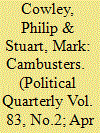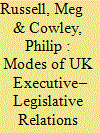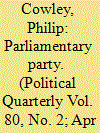| Srl | Item |
| 1 |
ID:
112090


|
|
|
|
|
| Publication |
2012.
|
| Summary/Abstract |
The backbench rebellion that hit the Coalition government in October 2011 was one of the largest Commons revolts of the postwar era, on any issue. But it was not just its size that was noteworthy. This article outlines ten points about the origins of the vote, its timing, its composition, and the nature of the divisions it revealed. Facilitated by recent procedural innovations in the Commons, the rebellion was both evidence of a longer-term rise in dissent amongst MPs of all parties, as well as other medium-and short-term factors within the Conservative party. It leaves the Prime Minister caught in an impossible triangle, attempting to satisfy his pro-European Liberal Democrat partners in the Coalition, while keeping his Euro-sceptic rebels happy, and yet retaining enough credibility in European capitals to negotiate successfully.
|
|
|
|
|
|
|
|
|
|
|
|
|
|
|
|
| 2 |
ID:
161659


|
|
|
|
|
| Summary/Abstract |
Anthony King's 1976 article ‘Modes of executive–legislative relations: Great Britain, France and West Germany’ is a classic in legislative studies. It argued that it is simplistic to analyse relations between ‘the executive’ and ‘the legislature’ in parliamentary systems, because parliaments are complex organisations comprised of competing actors. Instead, we must consider the various ‘modes’ through which these actors can interact to challenge the executive. As King pointed out, the classic view of the British Parliament was of a dominant ‘opposition mode’ and yet, in fact, the most important relationship was the ‘intraparty mode’: between the government and its own backbenchers. Other options, such as the ‘non‐party mode’ or ‘cross‐party mode’ were considered weak in Britain. This article revisits King's modes in the light of changes at Westminster during the intervening forty years. Developments such as the establishment of the select committee system and a more confident and party‐balanced House of Lords require significant changes to his conclusions. But his central insights, encouraging readers to focus on the multiple relationships inside legislatures, including those within political parties, remain fundamentally important.
|
|
|
|
|
|
|
|
|
|
|
|
|
|
|
|
| 3 |
ID:
092367


|
|
|
|
|
| Publication |
2009.
|
| Summary/Abstract |
The Conservative parliamentary party will fulfill three important functions for any incoming Conservative government: it will be the focus of attention for the national media; it will be the bulk vote that will deliver its legislative programme; it will form the talent pool from which members of any incoming government will be recruited. A majority Conservative government could see a majority of its MPs newly elected, with more Conservative women and ethnic minority MPs than ever before (although there will be little change in the socio-economic background of their MPs). These new MPs will present problems in terms of party management, although they will be less likely to rebel than longer-serving MPs. There are also relatively few signs of discontent among incumbent Conservative MPs (the article identifies the most rebellious Conservative MPs). Any new Conservative government will also have to deal with a reformed House of Lords, in which it will no longer have a majority.
|
|
|
|
|
|
|
|
|
|
|
|
|
|
|
|